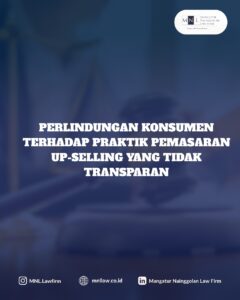
Pursuant to Article 1 point 2 of Law Number 8 of 1999 on Consumer Protection (UUPK), a consumer is defined as any individual who uses goods and/or services available in the community for personal, family, or other living beings’ purposes, and not for trade.
In modern business practices, marketing strategy is a key element to enhance competitiveness and increase sales volume. One commonly used strategy by business actors is up-selling, which involves offering products or services of higher value than initially selected by the consumer. Although up-selling is generally allowed, problems arise when business actors fail to provide clear and transparent information regarding additional costs or changes to the product specifications, thereby risking violation of the consumer
The consumer’s right to accurate, clear, and honest information is stipulated in Article 4 letter (c) of the UUPK. When a business actor fails to fulfill this obligation, up-selling may be deemed a practice that harms consumers as prohibited under Article 10 of the UUPK. Article 10 strictly prohibits the offering or promotion of goods and/or services in a false or misleading manner, including misrepresentations of price, quality, or product benefits.
Article 4 of the UUPK provides for consumer rights, including:
- Letter (c): the right to accurate, clear, and honest information regarding the condition and guarantee of goods and/or services;
- Letter (g): the right to be treated or served properly, fairly, and without discrimination.
In up-selling practices, consumers are frequently offered product add-ons or upgrades without being informed of the associated costs. For example, in the food and beverage sector, clerks may offer larger sizes or extra toppings without explaining that these incur additional charges. This practice is not only misleading but also violates the principles of transparency and good faith as stipulated in Article 7 letters (b) and (c) of the UUPK.
Article 7 outlines the obligations of business actors, including:
- Letter (b): providing accurate, clear, and honest information regarding the condition and guarantee of goods and/or services, along with instructions for use, repair, and maintenance;
- Letter (c): treating or serving consumers properly, fairly, and without discrimination.
If a consumer feels aggrieved, they may pursue legal remedies, one of which is through the Consumer Dispute Settlement Agency (BPSK). This demonstrates the seriousness of the state in protecting consumer rights and encouraging ethical business practices.
Additionally, the role of BPSK, as regulated under Minister of Trade Regulation No. 72 of 2020 concerning BPSK, serves as a non-litigation forum for resolving disputes involving consumers harmed by non-transparent up-selling practices.
Based on the above, it may be concluded that up-selling practices conducted without transparent information on pricing and product specifications constitute a violation of consumer rights as set forth in the UUPK. Business actors are obliged to uphold the principles of transparency and good faith. The state, through legal frameworks and institutions such as UUPK and BPSK, has established mechanisms for consumer protection and dispute resolution.
Therefore, education for business actors and consumers must be improved, and government supervision strengthened to ensure that marketing practices adhere to the values of honesty, transparency, and responsibility.
